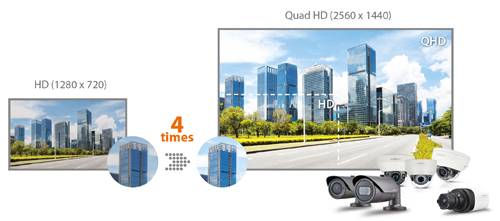 Uri Guterman, Head of Product & Marketing for Hanwha Techwin Europe, addresses why analogue based CCTV systems are still in favour more than a decade after many predicted that IP network based video surveillance would very quickly become the automatic choice for consultants, system designers, installers and system integrators.
Uri Guterman, Head of Product & Marketing for Hanwha Techwin Europe, addresses why analogue based CCTV systems are still in favour more than a decade after many predicted that IP network based video surveillance would very quickly become the automatic choice for consultants, system designers, installers and system integrators.
The advantages that network video surveillance systems offer over analogue CCTV are significant. These include:
- The opportunity to remotely view live or recorded images from anywhere on the network via a PC, smartphone or tablet.
- Resilience: Recorded video can be securely stored at any location on the network. A high level of redundancy can be introduced by choosing to simultaneously record and store video at multiple locations.
- The latest generation of high definition IP cameras are packed with practical features which ensure users are able to achieve so much more from their video surveillance solutions, e.g. onboard video analytics.
- A single network cable is also able to carry video, audio and data, as well as provide telemetry and Power over Ethernet (PoE).
Why analogue?
It does therefore seem at first sight to be surprising that analogue retains a loyal following. In fact, some recent market research has indicated that there is a resurgence in demand for analogue based solutions. Why are key influencers still recommending analogue CCTV systems to their clients, when migrating to, or utilising video over IP for new video surveillance projects, would seem to be a ‘no brainer’?
Recent high profile cyber attack incidents and the negative publicity revolving around hackers’ ability to access confidential data via a camera’s ‘back-door, has without doubt encouraged some product specifiers and security managers to reconsider the option of deploying a ‘closed circuit’ video surveillance system.
However, in many cases, analogue systems are still being specified or legacy systems retained, simply because the end-user is not yet ready to migrate to IP. They may not, for example, have a network infrastructure that can support a video surveillance system or provide the necessary bandwidth. If their existing analogue systems are still meeting their requirements, it may be difficult to justify the investment in upgrading or installing a new network.
Manufacturers have recognised that whilst it is imperative to keep pushing technological boundaries by further innovation of IP network technology, it is equally important to continue to offer support for the foreseeable future for analogue systems. The priority being to extend the life of legacy systems by introducing cameras which can deliver high definition images over existing coax cabling. They are able to do so with the help of Analogue HD (AHD) technology.
Offered by a number of manufacturers under different names, these cameras are able to deliver superb quality HD images over coaxial cables. They have been designed for end-users who want to benefit from being able to capture and record Full HD 1080p images, but are not yet ready to migrate from analogue to an IP network based video surveillance solution.
The cameras can support the transmission of HD images (and audio) without any latency or image loss, at distances up to 500m using standard coax, and the good news is that there is no need to incur the cost and time of installing encoders, converters or switches.
Digital Video Recorders (DVRs) with built-in AHD technology are able to support existing analogue and new HD+ cameras by simultaneously recording across all channels, whilst multi-streaming the transmission of images across the network and, if required, to mobile devices. As such, they offer end-users the opportunity to extend the life of their legacy systems and maximise ROI.
The Customer is King
It is perhaps inevitable and only a matter of time before advances in the fields of deep learning, artificial intelligence, augmented reality and the ‘Internet of Things’ will motivate the vast majority of end-users to deploy IP solutions. In the meantime, it is good business sense to offer clients the freedom to choose the technology which is right for them at any given time.
Any questions/comments? Email Uri Guterman here

